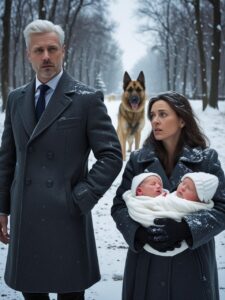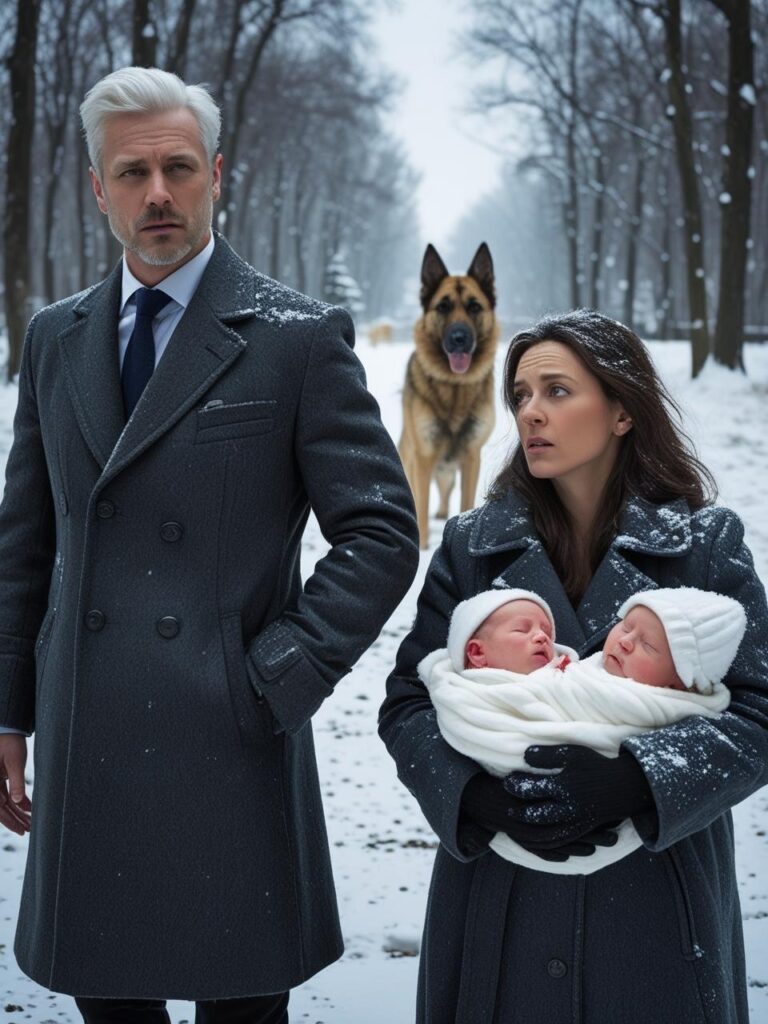The wind didn’t howl that night — it screamed.
Somewhere beyond the ridgeline, past the pine-dark hush of the Bitterroot wilderness, snow tore across the sky like it had something to prove. Trees groaned. Ice cracked underfoot. And still, the dog stood watching — silent, unmoving, as if waiting for a sign.
His name wasn’t known to the locals. Truth be told, the dog didn’t belong to anyone anymore, not since the fire on the eastern trail took more than just a family. Yet here he was again, ears pinned, breath steaming into the darkness. He had sensed something. Something wrong. Something not meant to happen.
The storm wasn’t just weather tonight. It was warning.
Hours earlier, a strange sound had pierced the forest’s usual hush — not wind, not wildlife, but something softer. A muffled cry. Barely audible through the snow. And still, the dog listened.
Then came the scent — blood, fear, milk, and ash. He moved fast, cutting between trees like he’d done it before. Some instincts aren’t taught. They’re carried in the bones.
That was when he saw her.
A woman — young, barefoot, bent low against the wind, her arms cradling two small bundles wrapped in a quilt. She wasn’t dressed for travel, let alone for survival. Her breath came in clouds. Her skin was pale. But it was her eyes — green and wide, locked with his through the storm — that made him pause.
Not wild. Not broken. Just… determined.
He didn’t bark. Didn’t lunge. Just stepped forward, then turned, glancing over his shoulder like he knew the trail she couldn’t see.
Behind her, far down the mountain, a figure watched from the warmth of a sprawling estate — coat dry, hands clean, heart colder than the storm itself. A man of money, title, and everything that looks like power from a distance. But not all things shine when held up to the fire. Not all protectors protect.
And someone else knew it now.
The dog saw.
He saw what happened behind that closed door — the shouted words, the slammed whiskey glass, the way no one offered the woman a coat when she was thrown into the cold. He saw what the man hoped no one ever would. And he remembered.
Not all heroes have voices. Some have teeth.

Some walk on four legs and follow footprints no one else notices. Some know the difference between kindness and cruelty by scent alone.
And some are waiting — even now — near a small cabin in the woods where firelight flickers and miracles still fight to survive.
—
The woman had no plan. Only instinct. She had run because she knew she had to. She had run because staying meant the end — for her and her babies. The man she once thought would care for them, love them, cherish the family they created… he had turned. Cold. Violent. He said twins were too much, that she was weak. That he “wasn’t made for this kind of life.”
She hadn’t even packed a bag. Just grabbed the nearest blanket, wrapped her babies, and left. The blizzard met her like a wall, but she pushed through. One trembling foot in front of the other. Praying. Hoping. Freezing.
And then, the dog.
She didn’t know where he had come from, only that he had come. That he was guiding her with purpose. That somehow, in the chaos of this storm, a single thread of fate still held.
For hours, the dog led her. When she slowed, he circled back. When she stumbled, he waited. When she fell, he stood guard.
Finally, just as the night pressed in fully, she saw it. A flicker. A cabin. Light behind fogged glass. Smoke curling from a crooked chimney. Her knees gave way the moment she reached the porch, and her hand struck the door.
It opened.
Inside was a woman. Older. Wrinkled. Stern at first glance. But her eyes softened the moment she saw the twins. No questions asked. Just action. The fire was stoked. Warm milk poured. The young mother wrapped in wool. Babies swaddled anew.
And the dog? He lay by the fire, watching, still. He didn’t move until the babies stirred. Then, he rose and sniffed their tiny feet, gently, like greeting kin.
—
By morning, the storm had passed. The sun rose weak and pale, but present. The woman who owned the cabin, whose name was June, made breakfast and told the young mother she could stay as long as needed.
Down the mountain, the rich man made calls. His voice was calm, but his lies sharp. Said she had gone mad. Taken the babies. Vanished in the night. He didn’t mention the shouting. The glass. The way he’d locked the nursery and tossed the only keys into the fire.
He thought the snow would hide the truth.
But snow melts. And stories rise.
—
Weeks passed. The young mother recovered. Her babies grew stronger. The dog never left. He walked the perimeter each night, returned each morning. The townsfolk, curious about the stranger woman and her twins, eventually heard the whispers.
And when one of them mentioned a certain estate owner, and the way his last wife had died mysteriously, and how his new lover vanished with twins in a storm, June narrowed her eyes.
She knew what evil looked like. She had seen it before. She had also seen what justice could be, when delivered not by courts, but by conscience.
So, she spoke. To neighbors. To an old forest ranger with a long memory. To a deputy who’d always distrusted the man in the estate.
And the dog?
He led them back. Right to the frozen cellar door where the truth lay buried — broken things, burned remnants, bones that shouldn’t have been there.
Evidence.
—
The man was arrested. Not for what he did that night. But for what he’d done long before.
The woman and her babies stayed on. The cabin became their home. June became family. And the dog, though still nameless, never left their side.
Some said he was just a stray.
Others said he was something more.
Either way, when the wind howls now across the Bitterroot wilderness, the locals sometimes look to the trees and think of him.
Because not all heroes wear capes.
Some wear fur.
And some remember everything.
—
**Epilogue**
Years passed, and the twins grew up strong — one curious and bold, the other gentle and wise. Their mother, now a teacher in the valley school, taught the children of the mountain town how to read, how to write, and how to recognize the signs of silence that speak louder than words.
The cabin grew, too — not in size, but in warmth. It became a place of refuge. Of stories. Of truth. Travelers would stop by with worn boots and heavy hearts, and June (who never stopped baking pies) would serve them tea while the dog, older now, lay beside the hearth, ears twitching in his sleep.
One day, when the twins were ten, a statue appeared near the trailhead — carved in local stone, rugged and loyal. It bore no name, just a simple inscription:
*“To the one who followed the wind. And found us.”*
The dog, in his final winter, climbed the ridge one last time.
No one saw him go.
But in spring, after the snow had melted, hikers found a small patch of ground cleared beneath a pine tree overlooking the cabin below. The earth was disturbed, gently. Like something had laid down and never gotten back up.
They left it alone.
Because some spirits deserve rest.
And some legacies are better whispered by wind through the trees, remembered by those who know:
Even in a storm, even in the coldest night — someone will find you.
Someone will still choose to care.


